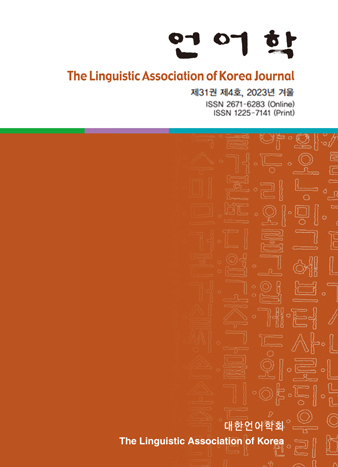대한언어학회 전자저널

31권 4호 (2023년 12월)
- QUD, Focus, and Adjunct Ellipsis
-
Jong Un Park
Pages : 153-179
Abstract
Park, Jong Un. (2023). QUD, focus, and adjunct ellipsis. The Linguistic Association of Korea Journal, 31(4), 153-179. The goal of this paper is to argue, building on Park (2022), that the deletion of an adjunct is restrictively allowed in Korean only when an elliptical clause is congruent with Questions Under Discussion (QUDs). However, since Parks analysis faces a couple of issues to be reconsidered, I elaborate his QUD-based approach, especially by incorporating Kobayashi et al.s (2023) claim that depending on the context, different types of focus, such as verum focus, contrastive focus, and negation of predicate focus, may play a role in evoking QUDs required for adjunct ellipsis licensing. Then, it is shown that the amended QUD approach can successfully explain not only the data of adjunct ellipsis previously dealt with by Park but also novel data inspired by Kobayashi et al. Finally, it is briefly discussed what the so-called verb-echo answers in Korean suggests to the proposed QUD approach.
Keywords
# adjunct ellipsis # QUD # focus # contrastive topic # verb-echo answers
References
- Ahn, H. -D., & Cho, S. (2021). On the distribution of missing arguments and adjuncts under the Pro approach. Language Research, 57(1), 111-142.
- Büring, D. (2003). On d-trees, beans, and b-accents. Linguistics and Philosophy, 26(5), 511-545.
- Collins, C. (2015). Adjunct deletion. Ms., New York University.
- Funakoshi, K. (2016). Verb-stranding verb phrase ellipsis in Japanese. Journal of East Asian Linguistics, 2, 113-142.
- Ginzburg, J., & Sag, I. (2000). Interrogative Investigations: The Form, Meaning and Use of English Interrogatives. CLSI publications.
- Grice, P. (1975). Logic and conversation. In Cole, P. & J. Morgan (eds.), Syntax and Semantics Vol. 3: Speech Acts. New York: Academic Press, pp. 41-58.
- Gutzmann, D., Hartmann, K., & Mattewson, L. (2020). Verum focus is verum, not focus: Cross-linguistic evidence. Glossa: A Journal of General Linguistics, 5(1), 51, 1–48
- Höhle, T. N. (1992). Über verum-fokus im Deutschen. In Joachim Jacobs (ed.), Informationsstruktur und Grammatik, pp. 112–141. Opladen: Westdeutscher Verlag.
- Jackendoff, R. (1972). Semantic Interpretation in Generative Grammar. Cambridge, MA: MIT Press.
- Kobayashi, R., Tanabe, T., & Sato, Y. (2023). Focusing on the diagnostic validity of the adjunct test in Japanese ellipsis: Where prosody meets information structure. Paper presented at the 25th Seoul International Conference on Generative Grammar (SICOGG 25). Dongguk University, Seoul.
- Kuno, S. (1982). Principles of discourse deletion: Case studies from English, Russian and Japanese. Journal of Semantics, 1, 61-93.
- Lee, W. (2016). Argument ellipsis vs. V-stranding VP ellipsis in Korean: Evidence from disjunction. Linguistic Research, 33, 1-20.
- Lee, W. (2019). Adjunct ellipsis in Korean. Ms., Konkuk University.
- Oku, S. (1998). LF copy analysis of Japanese null arguments. CLS 34, pp. 299-314.
- Oku, S. (2016). A note on ellipsis-resistant constituents. Nanzan Linguistics, 11, 56-70.
- Park, D.-W., & Park, M.-K. (2018) A pro-drop analysis of verb-echo answers in Korean. Language and Information, 22(2), 105-127.
- Park, J. U. (2022). Adjunct ellipsis and licensing conditions. Language and Linguistics, 95, 85-120.
- Park, M.-K. (1994). A morpho-syntactic study of Korean verbal inflection. Unpublished doctoral dissertation, University of Connecticut, Storrs.
- Recanati. F. (2010). Truth-conditional Pragmatics. Oxford: Clarendon Press.
- Roberts, C. (2012). Information structure in discourse: Towards an integrated formal theory of pragmatics. Semantics and Pragmatics, 5(6), pp. 1–69. Published version of draft circulated in 1996 and amended in 1998.
- Romero, M., & Han, C.-H. (2004). On negative yes/no questions. Linguistics and Philosophy, 27(5), 609-658.
- Simpson, A., Choudhury, A., & Menon, M. (2013). Argument ellipsis and the licensing of covert nominals in Bangla, Hindi and Malayalam. Lingua, 134, 123-138.